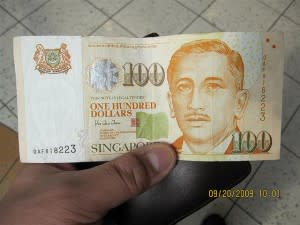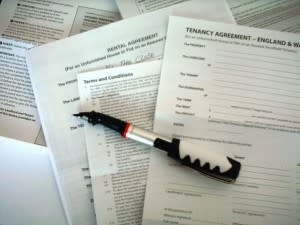Singapore’s Inflation Continues to 5.4%, When Will It End?
In news that’s about as surprising as “Apple overcharges customers”, Singapore’s inflation climbed to 5.4%. If you recall, it’s projected to hit 6%, so at least we so saw it coming. Does that help, that we predicted it? Does it help if I calmly lean over and whisper “We’re about to hit that bus and die” seconds before a head-on collision? I hope so, because that’s all we’ve got. Well, that and MoneySmart’s speculation on when the madness will end:

Question
- : What do you see in this picture?Answer: Nothing you can afford.
Remind Me Why It’s is So High?
I’d rather not; it causes me physical pain. Check out my previous article though. Anyway, two official reasons from the central bank and Trade and Industry Ministry:
Private Transport
Accommodation
Supposedly, these two factors account for two-thirds of April’s inflation. A quick explanation:
Private Transport
COE prices are at an all-time high. And if you’re a salesman, or have a medical condition, a car’s about as optional as your left leg. Likewise, people with children or special needs are sometimes stuck with buying one, whatever the price.
End result: These buyers push for raises or seek higher pay, and companies start to elevate prices.

It's not a luxury okay? I have a skin allergy to non-Mercedes car seats.
Accommodation
Accommodation costs are higher than Charlie Sheen on stage. I’m not just talking about buying houses; rent is also (awesome pun) through the roof. The ABSD channelled demand away from private properties, and right into the rental market.
Landlords have raised prices by 5 -10% since late 2011. And with the property market overheating like a cheap laptop, buyers are taking out bigger loans with heftier repayments.
End result: Same as private transport. People push for higher wages, and prices go up.
But when will it end?
I'm not buying. If the taxi driver can pronounce it, it's not upmarket enough.
A strong Singapore dollar means imports get cheaper. In case you haven’t noticed, we import practically everything. Food, sand, rich ass-hats with Ferraris, etc. The stronger the Singapore dollar, the more stuff it will fetch from overseas. This has an effect on your purchasing power. For example:
Say you want a laptop, and the retailer imports it from the US at a cost of $1200. Because of the exchange rate (currently SGD$1.27 = USD$1.00), you’d pay around $1533 for it.
But let’s say the currency exchange is SGD$1.10 = USD $1.00.
Now the laptop would cost (1,200 x 1.10) = $1320.
In effect, the more the Singapore dollar strengthens, the cheaper imports get. The cheaper imports become, the lower our overall cost of living. For the strengthening dollar to tame inflation, however, it needs time. Even when the Singapore dollar is strong enough, expect to wait several months before we feel the benefits.
Fine, I'll stand on it. But I don't think this is what the boss meant by strengthening our currency.
Some hopeful speculation here: COE prices might shrink between 2013 – 2015. At around 2005, the vehicle quota was quite high. Following the COE’s 10 year cycle, many of the cars bought in that period will start being de-registered by 2013-2015. In theory, this should lower COE prices.
There are two worries here: One is that the vehicle quota has been dropped to 0.5%, which means that even following mass de-registrations, demand for COEs will still be tight.
The second worry is that COE holders from 2005 will not be attracted by PARF rebates. They may cling to their COEs tighter than I did mum on the first day of pre-school, because current prices are too high.
But whatever the case, some relief must come the wind-down of the 2005 – 2015 batch. Assuming it makes cars more affordable, we might see a dip in inflation. Also, don’t forget the government has plans for COE relief in the works.
From now on, NO MORE COE! That said, we'd like to propose a 15,000% increase in petrol tax.
The oversupply of shoebox flats is only a downside if you bought one. In which case, you have as much right to complain as a mugger getting punched in the face.
Watch for a natural market correction: Once there are too many apartments for rent, the demand and rental rates will decrease. And the number of shoebox flats is set to quadruple (from 2500 to 9700) by 2015. Also, problems overseas (like the Eurozone crisis) may result in a cutback on expatriate packages, which means a lot of sudden vacancies.
In any case, it’s good news for tenants. Lower accommodation costs are great for young, working singles, whether local or foreign. Even if you don’t rent a new place, you’ll have wiggle room when re-negotiating your current lease. For all you know, that central region bachelor pad might become a reality come 2015.
Hmm, I like this shoebox, and you have no business sense. Here's an idea: You buy it and rent it to me.
Look toward the last quarter of the year, probably October, for all of this to kick-in. The most important condition is the strength of the Singapore Dollar. But even after MAS brings it to the right level, it will take time to sink in.
Even if the exchange rate improves, the purchase orders made at an earlier date are “locked in”. An example:
Say I put in a purchase order for 5,000 items from the US, at an exchange rate of SGD$1.27 to USD$1.00.
A month later, the exchange rate changes: SGD$1.20 to USD$1.00. Hurrah, imports are now cheaper.
Exchange rate's down in 10 minutes. Tell that cashier to hold the line open.
But even then, my customers won’t see my products get cheaper. I’d still sell that shipment of 5000 products as if we were on the older exchange rate, because that’s what it cost when I placed the order.
It’s only after that shipment of 5,000 is through that I’ll adjust my prices (assuming I’m honest).
So the Singapore dollar is strengthening as expected, but the cost of living won’t transform overnight. In the meantime, keep your budget tight. Don’t even think of buying a car or house. At least, not till you can survey the situation in October.
Image Credits:
zhaffsky, rubenerd, Milo Riano, Kojach, NobMouse, Lars Plougmann
When do you think Singapore’s inflation will end? Comment and let us know! Digg Digg
Get more Personal Finance tips and tricks on www.MoneySmart.sg
Click to Compare Singapore Home Loans, Car Insurance and Credit Cards on our other sites.
More From MoneySmart

1. The Singapore Dollar Strengthens Sufficiently

2. COE Relief In 2013 – 2015

3. Shoebox Oversupply Kicks In

Is There a Fixed Date to All This?


 Yahoo Finance
Yahoo Finance